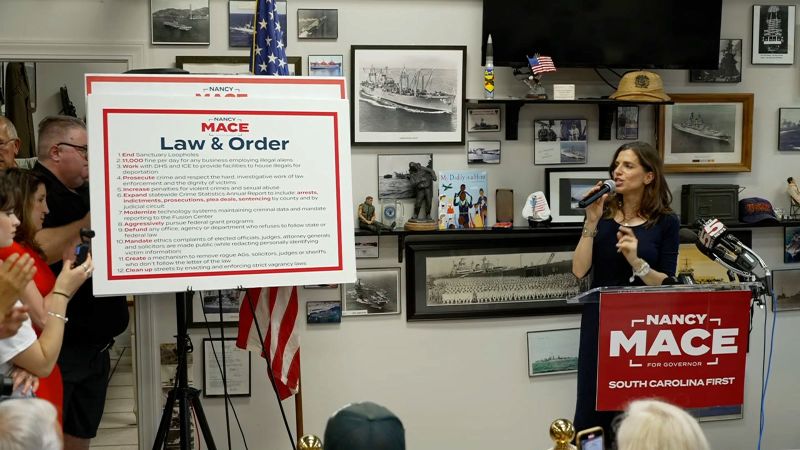In the competitive landscape of South Carolina politics, Republican Rep. Nancy Mace has recently positioned herself as a formidable candidate in the race for the governor’s mansion. Fresh off her announcement to run, Mace has been actively seeking the endorsement of former President Donald Trump, emphasizing her close ties to his administration during a public meeting with an enthusiastic audience. This engagement, held in front of a supportive crowd, is part of a broader strategy by Republican lawmakers to connect with constituents during their August recess from Congress.
The event, dubbed “The Mother of All Town Halls,” eschewed the traditional town hall format to take on the characteristics of a campaign rally as Mace laid out her vision for South Carolina’s future. Speeches like these are key opportunities for candidates to rally support and gather momentum going into election season, and Mace used this platform to assert her ambitions and the initiatives she would pursue as governor. The meeting took place outside of South Carolina’s First Congressional District, which Mace has represented since 2020, suggesting her commitment to maintaining a visible presence in the community as she considers future political ambitions.
Throughout her address, Mace took the opportunity to position herself very closely alongside Trump. She highlighted her past contributions to his agenda and also pointed out the significant impact of her actions, including a recent legal victory. She made reference to a $15 million defamation settlement from a lawsuit related to Trump’s presidential library, using this narrative to further define her loyalty and contributions to Trump’s political journey. Mace explicitly linked her political prospects to her relationship with the former president, saying, “If you talk to him, I would really like his support for governor.”
Her framing of past successes was assertive; she claimed credit for securing a historical $195 million infrastructure grant for South Carolina, successfully navigating the complexities of political negotiations to secure funding for vital infrastructure projects. Notably, she acknowledged the funding was tied to former President Joe Biden’s infrastructure law, a detail she seemed willing to downplay amidst her win claims. Mace stated, “I am one of the leading members of Congress who’s gotten resources for our state,” emphasizing her ability to advocate for South Carolina regardless of political alignments in voting patterns.
The spirited dialogue Mace employed in this meeting attracted attention not just for her ambitions, but also for the strategic jabs she made at her competitors within the GOP gubernatorial primary. Contending against other Trump-aligned candidates like Rep. Ralph Norman and state Attorney General Alan Wilson, Mace pressed her case for why she deserved Trump’s backing over her rivals. The competition is heating up, and this backdrop sets the stage for a potentially contentious primary in which each candidate will aim to leverage their connections to Trump while also distinguishing themselves.
Mace expressed her beliefs openly, particularly regarding divisive issues such as the rights of transgender individuals. She voiced strong support for policies that would uphold her views on gender and bathroom access, which resonated with certain segments of the Republican base. Furthermore, she demonstrated her assertive stance on local politics by supporting Texas’ efforts to adjust congressional maps – a signal of her deep engagement with key issues that resonate with conservative voters.
As this gubernatorial race unfolds, Mace finds herself at a critical juncture, where aligning with Trump may yield significant rewards. Yet, her trajectory and the navigation of political waters will require not only appealing to Trump’s base but also understanding a diverse electorate that may not lean uniformly in support of hardline partisan agendas. The event served not just as a campaign rally but as an essential indicator of how Mace aims to anchor her gubernatorial appeal amidst a shifting political landscape in South Carolina.











